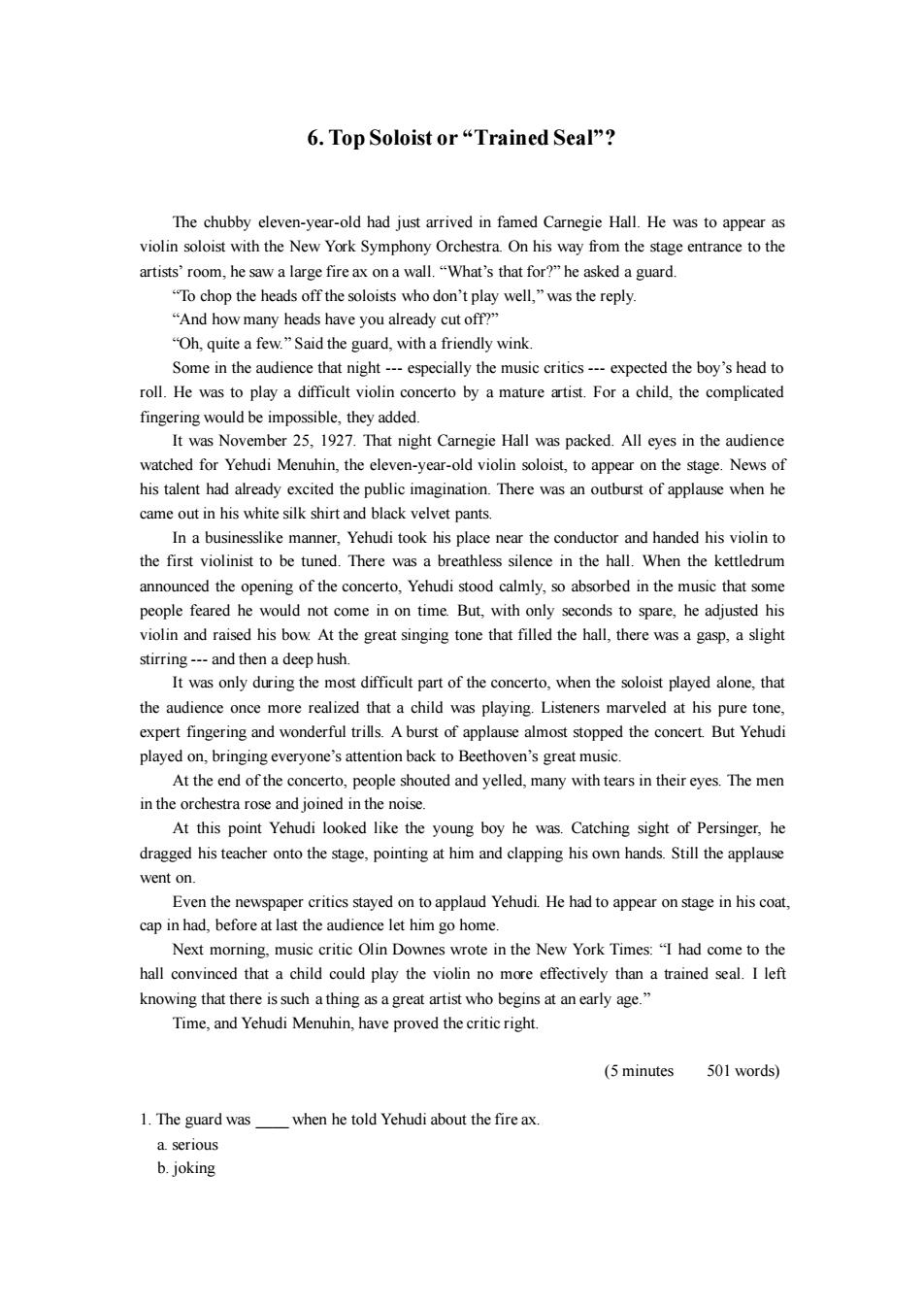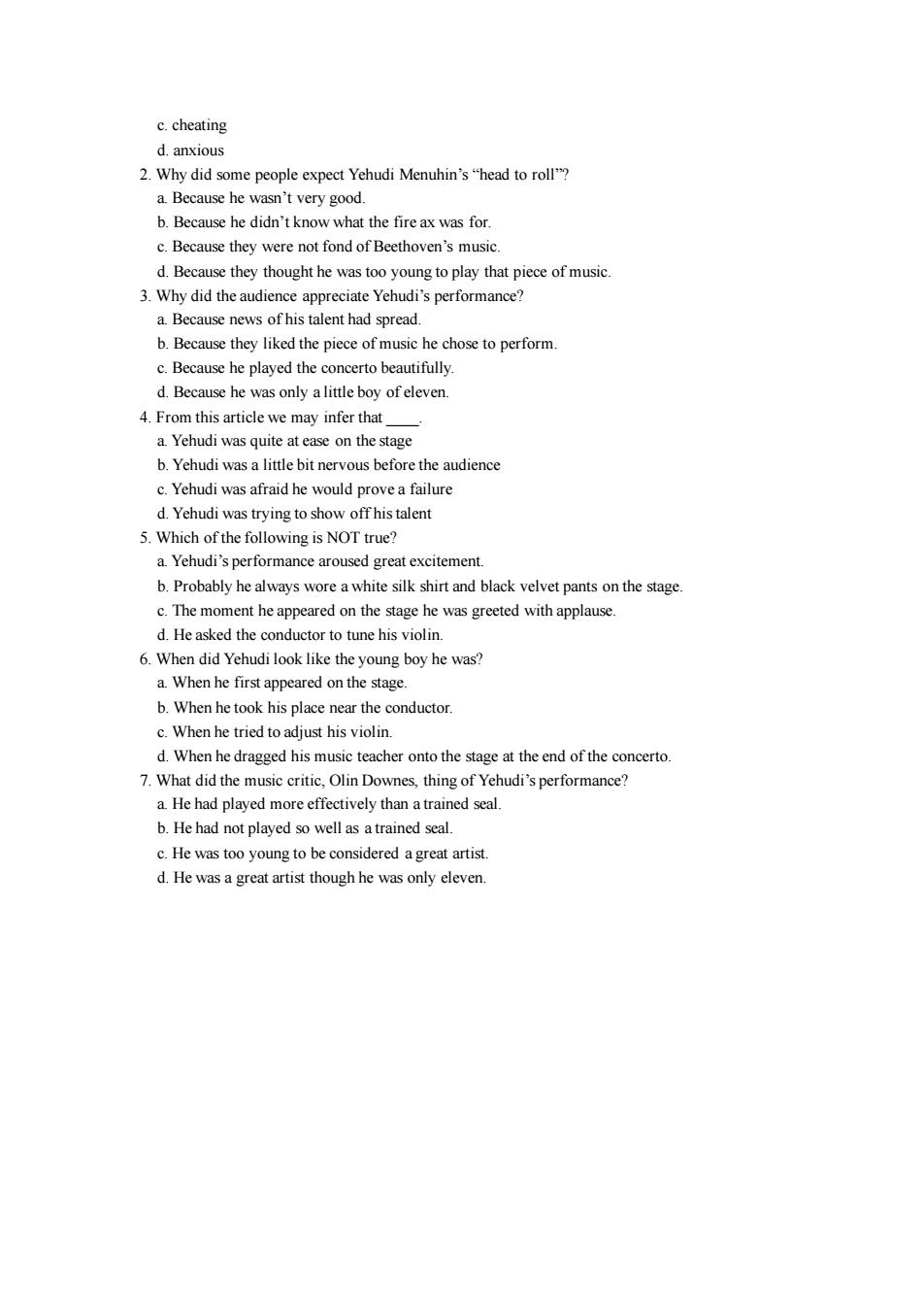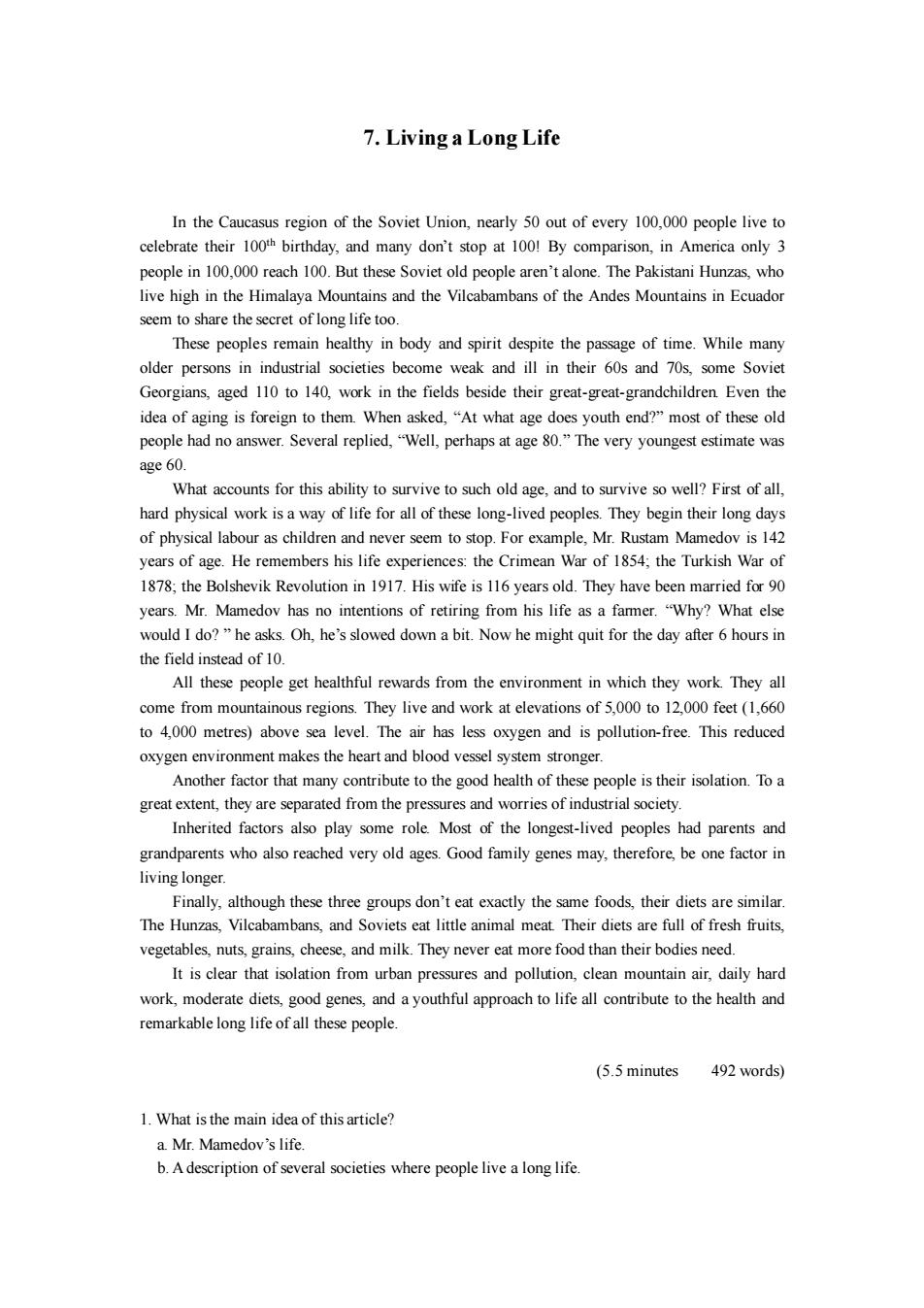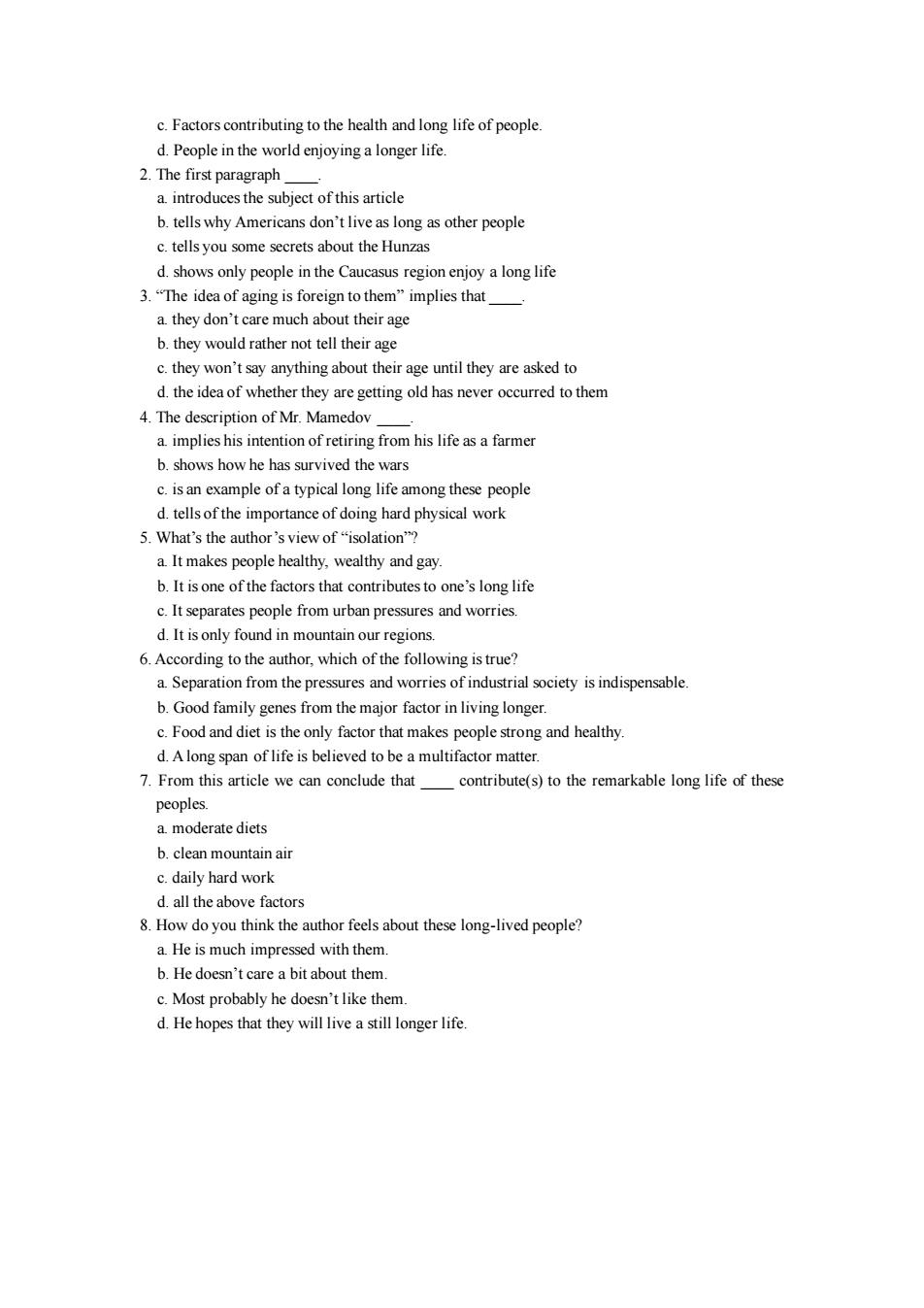
6.Top Soloist or"Trained Seal"? The chubby eleven-year-old had just arrived in famed Carnegie Hall.He was to appear as violin soloist with the New York Symphony Orchestra.On his way from the stage entrance to the artists'room,he saw a large firea ona wall."What's that for?"he asked a guard. ofrthesoloig who don'tplay well.was the reply "And how many heads have you already cut off? "Oh,quite a few."Said the guard,with a friendly wink. Some in the audience that night-especially the music critics---expected the boy's head to roll.He was to play a difficult violin concerto by a mature artist.For a child,the complicated fingering would be sihle they added It was November 25.1927 7.That night Carnegie Hall was packed.All eyes in the audienc watched for Yehudi Menuhin.the eleven-year-old violin soloist,to appear on the stage.News of his talent had already excited the public imagination.There was an outburst of applause when he came out in his white silk shirt and black velvet pants. In a businesslike manner,Yehudi took his place near the conductor and handed his violin to ence in the hall.When the ketledru announced the opening of the concerto,Yehudi stood calmly,so absorbed in the music that som people feared he would not come in on time But,with only seconds to spare,he adjusted his violin and raised his bow At the great singing tone that filled the hall,there was a gasp,a slight stirringand then a deep hush. was during the most difficult part of the c when the soloist played alone.that the audience once more realized that a child was playing Listeners marveled at his pure tone expert fingering and wonderful trills.A burst of applause almost stopped the concert But Yehud played on,bringing everyone's attention back to Beethoven's great music. At the end of the concerto.people shouted and velled.many with tears in their eves The men in the orchestra rose and joned At this point Yehudi looked like the young boy he was.Catching sight of Persinger,he dragged his teacher onto the stage,pointing at him and clapping his own hands.Still the applause went on. Even the newspaper critics staved on to applaud Yehudi.He had to appear on stage in his coat cap in had,before at last the audience let him go home. Next mo m eritic Olin Down rote in the New York Times:"I had come to the hall convinced that a child could play the violin no more effectively than a trained seal.I left knowing that there is such a thing as a great artist who begins at an early age." Time.and Yehudi Menuhin,have proved the critic right. (5minutes 501 words) 1.The guard was when he told Yehudi about the fire ax. a.serious b.joking
6. Top Soloist or “Trained Seal”? The chubby eleven-year-old had just arrived in famed Carnegie Hall. He was to appear as violin soloist with the New York Symphony Orchestra. On his way from the stage entrance to the artists’ room, he saw a large fire ax on a wall. “What’s that for?” he asked a guard. “To chop the heads off the soloists who don’t play well,” was the reply. “And how many heads have you already cut off?” “Oh, quite a few.” Said the guard, with a friendly wink. Some in the audience that night --- especially the music critics --- expected the boy’s head to roll. He was to play a difficult violin concerto by a mature artist. For a child, the complicated fingering would be impossible, they added. It was November 25, 1927. That night Carnegie Hall was packed. All eyes in the audience watched for Yehudi Menuhin, the eleven-year-old violin soloist, to appear on the stage. News of his talent had already excited the public imagination. There was an outburst of applause when he came out in his white silk shirt and black velvet pants. In a businesslike manner, Yehudi took his place near the conductor and handed his violin to the first violinist to be tuned. There was a breathless silence in the hall. When the kettledrum announced the opening of the concerto, Yehudi stood calmly, so absorbed in the music that some people feared he would not come in on time. But, with only seconds to spare, he adjusted his violin and raised his bow. At the great singing tone that filled the hall, there was a gasp, a slight stirring --- and then a deep hush. It was only during the most difficult part of the concerto, when the soloist played alone, that the audience once more realized that a child was playing. Listeners marveled at his pure tone, expert fingering and wonderful trills. A burst of applause almost stopped the concert. But Yehudi played on, bringing everyone’s attention back to Beethoven’s great music. At the end of the concerto, people shouted and yelled, many with tears in their eyes. The men in the orchestra rose and joined in the noise. At this point Yehudi looked like the young boy he was. Catching sight of Persinger, he dragged his teacher onto the stage, pointing at him and clapping his own hands. Still the applause went on. Even the newspaper critics stayed on to applaud Yehudi. He had to appear on stage in his coat, cap in had, before at last the audience let him go home. Next morning, music critic Olin Downes wrote in the New York Times: “I had come to the hall convinced that a child could play the violin no more effectively than a trained seal. I left knowing that there is such a thing as a great artist who begins at an early age.” Time, and Yehudi Menuhin, have proved the critic right. (5 minutes 501 words) 1. The guard was ____ when he told Yehudi about the fire ax. a. serious b. joking

c.cheating anxiou 2.Why did some people expect Yehudi Menuhin's"head to roll a.Because he wasn't very good. b Because he didn't know what the fire ax was for c.Because they were not fond of Beethoven's music d.Because they thought he was too young to play tha piece of music Why did the audience appreciate Yehudi's performance a.Because news of his talent had spread b.Because they liked the piece of music he chose to perform c.Because he plaved the concerto beautifully. d.Because he was only alittle boy of eleven 4.From this article we may infer tha a.Yehudi was quite at ease on the stag b.Yehudi was a little bit nervous before the audience c.Yehudi was afraid he would prove a failure d.Yehudi was trying to show offhis talent 5.Which of the following is NOTtrue? aroused great b.Probably he always wore a white silk shirt and black velvet pants on the stage c.The moment he appeared on the stage he was greeted with applause. d.He asked the conductor to tune his violin. .When did like the yong boy he a When he first appeared on the b.When he took his place near the conductor. c.When he tried to adiust his violin. d.When he dragged his music teacher onto the stage at the end of the concerto 7.What did the music Oin Downes,thing of Yehudi'sperformance? aHe had played more vely thar ed seal b.He had not played so well as atrained scal c.He was too young to be considered a great artist. d.He was a great artist though he was only eleven
c. cheating d. anxious 2. Why did some people expect Yehudi Menuhin’s “head to roll”? a. Because he wasn’t very good. b. Because he didn’t know what the fire ax was for. c. Because they were not fond of Beethoven’s music. d. Because they thought he was too young to play that piece of music. 3. Why did the audience appreciate Yehudi’s performance? a. Because news of his talent had spread. b. Because they liked the piece of music he chose to perform. c. Because he played the concerto beautifully. d. Because he was only a little boy of eleven. 4. From this article we may infer that ____. a. Yehudi was quite at ease on the stage b. Yehudi was a little bit nervous before the audience c. Yehudi was afraid he would prove a failure d. Yehudi was trying to show off his talent 5. Which of the following is NOT true? a. Yehudi’s performance aroused great excitement. b. Probably he always wore a white silk shirt and black velvet pants on the stage. c. The moment he appeared on the stage he was greeted with applause. d. He asked the conductor to tune his violin. 6. When did Yehudi look like the young boy he was? a. When he first appeared on the stage. b. When he took his place near the conductor. c. When he tried to adjust his violin. d. When he dragged his music teacher onto the stage at the end of the concerto. 7. What did the music critic, Olin Downes, thing of Yehudi’s performance? a. He had played more effectively than a trained seal. b. He had not played so well as a trained seal. c. He was too young to be considered a great artist. d. He was a great artist though he was only eleven

7.Living a Long Life In the Caucasus region of the Soviet Union,nearly 50 out of every 100.000 people live to celebrate their 100th birthday,and many don't stop at 100!By comparison,in America only 3 cople.The Pakistani ains and the Vilcabambans of the Andes M ountains in Ecuador seem to share the secret of long life too These peoples remain healthy in body and spirit despite the passage of time.While many older persons in industrial societies become weak and ill in their 60s and 70s,some Soviet Georgians,aged 110 to 140.work in the fields beside their great-great-grandchildren Even the skcd,“At what age es youth end? most of these old oWil0The very y age 60 What accounts for this ability to survive to such old age.and to survive so well?First of all. hard physical work is a way of life for all of these long-lived peoples.They begin their long days exam Mr.Rustam Mamedov is 142 of age He mbers his lif e Crimean f1854:the Turkish War of 1878,the Bolshevik Revolution in 1917.His wife is 116 yearsold.They have been married for9 years.Mr.Mamedov has no intentions of retiring from his life as a fammer."Why?What else would I do?"he asks Oh,he's slowed down a bit.Now he might quit for the day after 6 hours in the field instead of 10 All these peop e get healthful r ew ards from the en ment in which the vork They all come from mountainous regions.They live and work at elevations of 5,000 to 12,000 feet(1,660 to 4.000 metres)above sea level.The air has less oxygen and is pollution-free.This reduced oxygen environment makes the heart and blood vessel system stronger. Another factor that many to the good health of these people is their isolation.Ta great and worries of indu ial society Inherited factors aso Most of the ongest-lived peoples had parents and grandparents who also reached very old ages.Good family genes may,therefore,be one factor in living longer Finally,although these three groups don't eat exactly the same foods,their diets are similar. The Hunzas,Vilcabambans,and Soviets eat little animal meat Their diets are full of fresh fruits. vegetables milk.They never eat more food than their bodiesneed It is clear that isolation from urban pressures and pollution,clean mountain air,daily hard work.moderate diets.good genes.and a youthful approach to life all contribute to the health and remarkable long life of all these people. (5.5minutes 492 words) 1.What is the main idea of this article? a.Mr.Mamedov's life. b.A description of several societies where people live a long life
7. Living a Long Life In the Caucasus region of the Soviet Union, nearly 50 out of every 100,000 people live to celebrate their 100th birthday, and many don’t stop at 100! By comparison, in America only 3 people in 100,000 reach 100. But these Soviet old people aren’t alone. The Pakistani Hunzas, who live high in the Himalaya Mountains and the Vilcabambans of the Andes Mountains in Ecuador seem to share the secret of long life too. These peoples remain healthy in body and spirit despite the passage of time. While many older persons in industrial societies become weak and ill in their 60s and 70s, some Soviet Georgians, aged 110 to 140, work in the fields beside their great-great-grandchildren. Even the idea of aging is foreign to them. When asked, “At what age does youth end?” most of these old people had no answer. Several replied, “Well, perhaps at age 80.” The very youngest estimate was age 60. What accounts for this ability to survive to such old age, and to survive so well? First of all, hard physical work is a way of life for all of these long-lived peoples. They begin their long days of physical labour as children and never seem to stop. For example, Mr. Rustam Mamedov is 142 years of age. He remembers his life experiences: the Crimean War of 1854; the Turkish War of 1878; the Bolshevik Revolution in 1917. His wife is 116 years old. They have been married for 90 years. Mr. Mamedov has no intentions of retiring from his life as a farmer. “Why? What else would I do? ” he asks. Oh, he’s slowed down a bit. Now he might quit for the day after 6 hours in the field instead of 10. All these people get healthful rewards from the environment in which they work. They all come from mountainous regions. They live and work at elevations of 5,000 to 12,000 feet (1,660 to 4,000 metres) above sea level. The air has less oxygen and is pollution-free. This reduced oxygen environment makes the heart and blood vessel system stronger. Another factor that many contribute to the good health of these people is their isolation. To a great extent, they are separated from the pressures and worries of industrial society. Inherited factors also play some role. Most of the longest-lived peoples had parents and grandparents who also reached very old ages. Good family genes may, therefore, be one factor in living longer. Finally, although these three groups don’t eat exactly the same foods, their diets are similar. The Hunzas, Vilcabambans, and Soviets eat little animal meat. Their diets are full of fresh fruits, vegetables, nuts, grains, cheese, and milk. They never eat more food than their bodies need. It is clear that isolation from urban pressures and pollution, clean mountain air, daily hard work, moderate diets, good genes, and a youthful approach to life all contribute to the health and remarkable long life of all these people. (5.5 minutes 492 words) 1. What is the main idea of this article? a. Mr. Mamedov’s life. b. A description of several societies where people live a long life

c.Factors contributing to the health and long life of people. d.People in the world enjoyinga longer life 2.The first paragraph a.introduces the subject of this article b.tells why Americans don't live as long as other people c.tells you some secrets about the Hunzas d.show 3.The idea of aging is foreign to them implies that a.they don't care much about their age b.they would rather not tell their age c.they won't say anything about their age until they are asked to d.the idea of whether they are getting old has never occurred to them 4.The description of Mr Mamedo a implies his intention of retiring from his life as a farmer b.shows how he has survived the wars c.is an example of a typical long life among these people d.tells of the importance of doing hard physical work 5.What's the author's vi a It makes people healthy,wealthy and gay b.It is one of the factors that contributes to one's long life c.It separates people from urban pressures and worries d.It isonly found in mountain our regions. strial society is indispensable. b.Good family genes from the major factor in living longer c.Food and diet is the only factor that makes people strong and healthy d.A long span of life is believed to be a multifactor matter. 7.From this artice we can that contribute(s)to the remarkable long life of these peoples. amoderate diets b.clean mountain air c daily hard work d all the above factors 8.How doyou think the author feels about these long-lived people? a He ismuch impressed with them b.He doesn't care a bit about them c.Most probably he doesn't like them d.He hopes that they will live a still longer life
c. Factors contributing to the health and long life of people. d. People in the world enjoying a longer life. 2. The first paragraph ____. a. introduces the subject of this article b. tells why Americans don’t live as long as other people c. tells you some secrets about the Hunzas d. shows only people in the Caucasus region enjoy a long life 3. “The idea of aging is foreign to them” implies that ____. a. they don’t care much about their age b. they would rather not tell their age c. they won’t say anything about their age until they are asked to d. the idea of whether they are getting old has never occurred to them 4. The description of Mr. Mamedov ____. a. implies his intention of retiring from his life as a farmer b. shows how he has survived the wars c. is an example of a typical long life among these people d. tells of the importance of doing hard physical work 5. What’s the author’s view of “isolation”? a. It makes people healthy, wealthy and gay. b. It is one of the factors that contributes to one’s long life c. It separates people from urban pressures and worries. d. It is only found in mountain our regions. 6. According to the author, which of the following is true? a. Separation from the pressures and worries of industrial society is indispensable. b. Good family genes from the major factor in living longer. c. Food and diet is the only factor that makes people strong and healthy. d. A long span of life is believed to be a multifactor matter. 7. From this article we can conclude that ____ contribute(s) to the remarkable long life of these peoples. a. moderate diets b. clean mountain air c. daily hard work d. all the above factors 8. How do you think the author feels about these long-lived people? a. He is much impressed with them. b. He doesn’t care a bit about them. c. Most probably he doesn’t like them. d. He hopes that they will live a still longer life